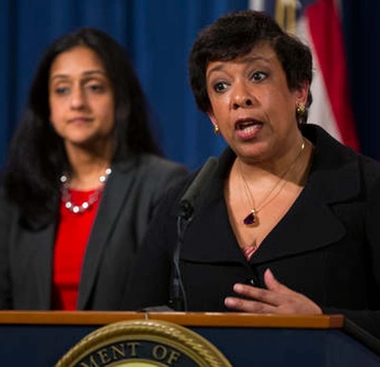DOJ civil rights chief seeks more rights work as prosecutor sets up unit

Jackson, Miss. (AP) — The head of the U.S. Justice Department's Civil Rights Division says there's more work to be done to guarantee the rights of citizens in Mississippi and nationwide.
"Today we still see a real gap between what the law guarantees, on one hand, and what people experience, on the other," Vanita Gupta, head of the division, said Wednesday at a civil rights law conference in Jackson. "And in too many communities across the country, the founding promise of America remains unfulfilled and unrealized."
Gupta spoke Wednesday at an event organized by Gregory Davis, U.S. attorney for the Southern District of Mississippi, who announced he's creating a four-person section in his office to investigate and prosecute noncriminal civil rights violations. The group could consider cases including voting rights, religious rights, housing discrimination and disability cases. Davis said some other federal prosecutors have created similar sections.
"We've always had a commitment to civil rights here," said Davis, the first black U.S. attorney in the district, having served since 2013.
The nationwide Civil Rights Division has continued to be active in Mississippi, with Gupta specifically citing recent involvement in a school desegregation case in Cleveland, issues surrounding the criminalization of juvenile behavior in Meridian, and criminal prosecutions of the death of Jackson resident James Craig Anderson.
Speaking of the department's efforts to consolidate pairs of high schools and middle schools in Cleveland, Gupta said her division wants to make sure all children get equal opportunity.
"But we also know what happens, and what communities gain from having integrated schools, from having children actually grow up in the real world, and experience the world as we as adults experience it, in a racially diverse kind of environment," she said.
Gupta mentioned the Justice Department's opposition to a North Carolina law that limits bathroom options for transgender people and prohibits local communities from enacting anti-discrimination ordinances. She didn't specifically mention the Mississippi law signed later that allows religious groups and some private businesses to deny services to gay and transgender people or unmarried parents, but said such efforts "not only violate the laws that govern our nation, but also the values that define us as a people."
She said legal guidance to schools and colleges on use of bathrooms and locker rooms by transgender students stemmed from inquires by schools and colleges.
"We look forward to working with school officials to make the promise of equal opportunity a reality for all of our children," Gupta said.
Mississippi's Department of Education flipped from advising schools to let transgender students use bathrooms and locker rooms that match their gender identity to telling them to ignore the guidance under political pressure. Gov. Phil Bryant wants to join a group of states suing the federal government over the guidance, though Attorney General Jim Hood, the only Democrat in statewide office in Mississippi, has said he won't represent Bryant.
By Jeff Amy, Associated Press. Copyright 2016 The Associated Press. All rights reserved. This material may not be published, broadcast, rewritten or redistributed.
The Gayly – June 8, 2016 @ 8 a.m.





